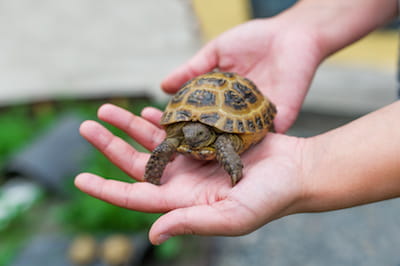Pet turtles can make your kids really sick. Here’s how.
My kids have asked me on numerous occasions if we could get a pet turtle. We’ve found tiny turtles scurrying in the grass near the lake, big ones wandering alone in the park or sweet little creatures in the tank at pet stores. My kids wouldn’t care where they came from, but they want one, badly. I’ve said no every single time.
Perhaps you’re thinking I’m just a mean mom. Maybe. But the reason I don’t want a pet turtle is simple. Turtles (along with lizards, geckos, snakes and frogs) are often carriers of the bacteria Salmonella, which can cause serious, even life-threatening, illness.
 The Centers for Disease Control and Prevention (CDC) recently announced a multi-state outbreak of Salmonella infection linked to pet turtles. This current outbreak has sickened 33 people, 16 of which required hospitalization. No deaths have yet been reported in this outbreak, but it is possible to die of Salmonella infection, especially if contracted by very young children, the elderly or immunocompromised people. (Salmonella is the same bacteria that is sometimes present in raw chicken and raw eggs, which is why we don’t eat raw or undercooked poultry).
The Centers for Disease Control and Prevention (CDC) recently announced a multi-state outbreak of Salmonella infection linked to pet turtles. This current outbreak has sickened 33 people, 16 of which required hospitalization. No deaths have yet been reported in this outbreak, but it is possible to die of Salmonella infection, especially if contracted by very young children, the elderly or immunocompromised people. (Salmonella is the same bacteria that is sometimes present in raw chicken and raw eggs, which is why we don’t eat raw or undercooked poultry).
People infected by Salmonella can have diarrhea, fever, stomach pain, nausea, vomiting, and headache. Symptoms usually appear 6 to 72 hours after exposure. Some people will recover on their own while others may require hospitalization.
Expert advice about pet turtles
Here’s what pediatricians as well as experts at the Food and Drug Administration (FDA) and the CDC say about pet turtles: Just say no.
Small turtles with a shell length less than 4 inches in size seem to be especially prone to be carriers of Salmonella (and, of course these ARE the cutest), and they can spread the bacteria to your hands, your children’s hands, countertops, sinks- almost anything. You can be exposed to the dangerous bacteria through touching or holding the animal, feeding it, cleaning the aquarium or changing the water and the germs can easily be spread throughout the house.
It is especially important for households with children under 5 years of age, adults over 65 years of age or people with weakened immune systems not to have pets that can carry Salmonella, such as turtles or other reptiles.
If you do have a pet turtle, know how to prevent illness
If you just weren’t able to withstand the begging and pleading from your kids and you find yourself the reluctant owner of a pet turtle, here are some common-sense steps you can take to avoid illness in your family:
- If you have to get a turtle, get one with a shell size larger than 4 inches in diameter.
- Wash your hands thoroughly with soap and water after each and every contact with the turtle and its habitat.
- Teach your children thorough handwashing and supervise small children in doing so.
- Don’t touch your face, other people or any other surface before washing your hands after you’ve touched the turtle.
- Don’t handle a turtle and an infant at the same time.
- Don’t allow the turtle to roam freely throughout the house, as every surface it touches is potentially contaminated.
- Don’t use your kitchen sink to clean the turtle habitat and don’t allow the turtle near food preparation areas.
- When cleaning the turtle’s tank, cage or aquarium or bathing the turtle, thoroughly disinfect the surface with bleach afterward.
If you have a pet turtle and no longer want to keep it, you may be able to find pet stores, local zoos or animal shelters that will rescue unwanted turtles. This is certainly a very personal decision, but keep the health and safety of your family as your first priority.
For more information on turtles and Salmonella visit the FDA or CDC websites.







